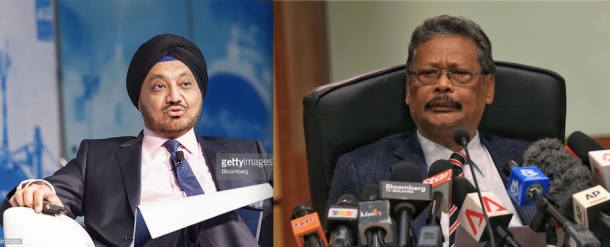REPOST of article first published in 2017.The conclusions are self-evident.
Friday, April 28, 2017
LCIA IPIC-1MDB consent award further complicated by revelation that IPIC is directly involved in a sham transaction,not disclosed to holders of its debt securities
by Ganesh Sahathevan
Singapore's main English daily, the government owned Straits Times, reported on Friday 28 April 2017:
According to senior financial and legal executives, the main hurdle was fund units amounting to US$2.43 billion (S$3.4 billion) held by two 1MDB subsidiaries, Brazen Sky and 1MDB Global Investments, that were guaranteed by IPIC subsidiary Aabar Investments PJS. Aabar had disputed the guarantee.
To overcome the hurdle, 1MDB agreed to waive its right to claim from Aabar the US$2.43 billion guarantee. In return, Abu Dhabi arranged for an undisclosed entity domiciled in the Seychelles to buy the units from 1MDB at the guaranteed value, to be settled by deferred payments from this month to October 2022, said a senior financial executive familiar with the matter.
The transaction highlighted above implies that IPIC is involved in a round robin transaction where it is in effect paying itself. Worse, the transaction will be booked at the guaranteed value , even after the guarantee is waived. This is clearly a sham transaction.
This new Straits Times revelation adds to the issues of illegality that taint the IPIC-1MDB settlement (see story below),and in fact shows IPIC itself to be directly involved in a new transaction in which the implication of money laundering is hard to avoid.
In addition , given IPIC's reporting obligations to the London Stock Exchange and its own bondholders pursuant to its GMTN debt programme, the ST story shows IPIC to be guilty of concealing material information from the market.
The London Court Of International Arbitration (LCIA) is being asked to hand down a consent award that will encompass this and all the other transactions currently under investigation by the US Department Of Justice and the FBI, who the Malaysian Government has made no secret they expect will be defeated by the LCIA consent award.
The likelihood that the consent award will be denied to illegality gets ever more likely.
END
Thursday, April 27, 2017
Illegality may prevent London Arbitration Court from making a consent award in the IPIC-1MDB matter-Settlement may be denied
Settlement weakens DOJ's case
IPIC informed the LSE on Monday:
International Petroleum Investment Company PJSC (IPIC), Aabar Investments PJS (Aabar), the Minister of Finance (Incorporated) Malaysia (MoF Inc.) and 1Malaysia Development Berhad (1MDB) are pleased to announce that an agreement has been reached between all parties that provides for a settlement in respect to the arbitration proceedings at the London Court of International Arbitration (the Settlement). The agreement is conditional on the Arbitration Tribunal making a consent award by 31 May 2017.
Meanwhile, a senior figure in the Malaysian Government and ruling UMNO ,Puad Zarkashi, has said publicly that the settlement is intended to defeat a criminal investigation by the US Department of Justice ,and other national enforcement agencies into 1 MDB, the Malaysian Government and Najib Razak , the Prime Minister and Finance Minister:
"This arbitration settlement has weakened the US DOJ civil suit and claims that 1MDB's funds were stolen," said Umno supreme council member Mohd Puad Zakarshi in a statement today.Mohd Puad is also the director-general of the Information Ministry's Special Affairs Division (Jasa).
While the rules governing arbitration courts are complex, it is hard to see that the London Court Of International Arbitration would want to be a party to a consent award where at least one party has made public that the award will be used as a means to defeat a a criminal investigation.To make matters worse, this is a matter that has been very widely publicized. worldwide and it would be impossible for anyone, including the arbitrators in this matter, to deny knowledge of what is intended.
END
Other references:
IPIC informed the LSE on Monday:
International Petroleum Investment Company PJSC (IPIC), Aabar Investments PJS (Aabar), the Minister of Finance (Incorporated) Malaysia (MoF Inc.) and 1Malaysia Development Berhad (1MDB) are pleased to announce that an agreement has been reached between all parties that provides for a settlement in respect to the arbitration proceedings at the London Court of International Arbitration (the Settlement). The agreement is conditional on the Arbitration Tribunal making a consent award by 31 May 2017.
Meanwhile, a senior figure in the Malaysian Government and ruling UMNO ,Puad Zarkashi, has said publicly that the settlement is intended to defeat a criminal investigation by the US Department of Justice ,and other national enforcement agencies into 1 MDB, the Malaysian Government and Najib Razak , the Prime Minister and Finance Minister:
"This arbitration settlement has weakened the US DOJ civil suit and claims that 1MDB's funds were stolen," said Umno supreme council member Mohd Puad Zakarshi in a statement today.Mohd Puad is also the director-general of the Information Ministry's Special Affairs Division (Jasa).
While the rules governing arbitration courts are complex, it is hard to see that the London Court Of International Arbitration would want to be a party to a consent award where at least one party has made public that the award will be used as a means to defeat a a criminal investigation.To make matters worse, this is a matter that has been very widely publicized. worldwide and it would be impossible for anyone, including the arbitrators in this matter, to deny knowledge of what is intended.
END
Other references:







No comments:
Post a Comment